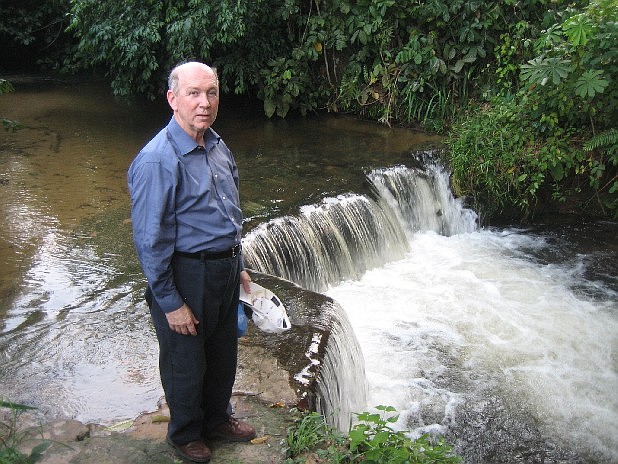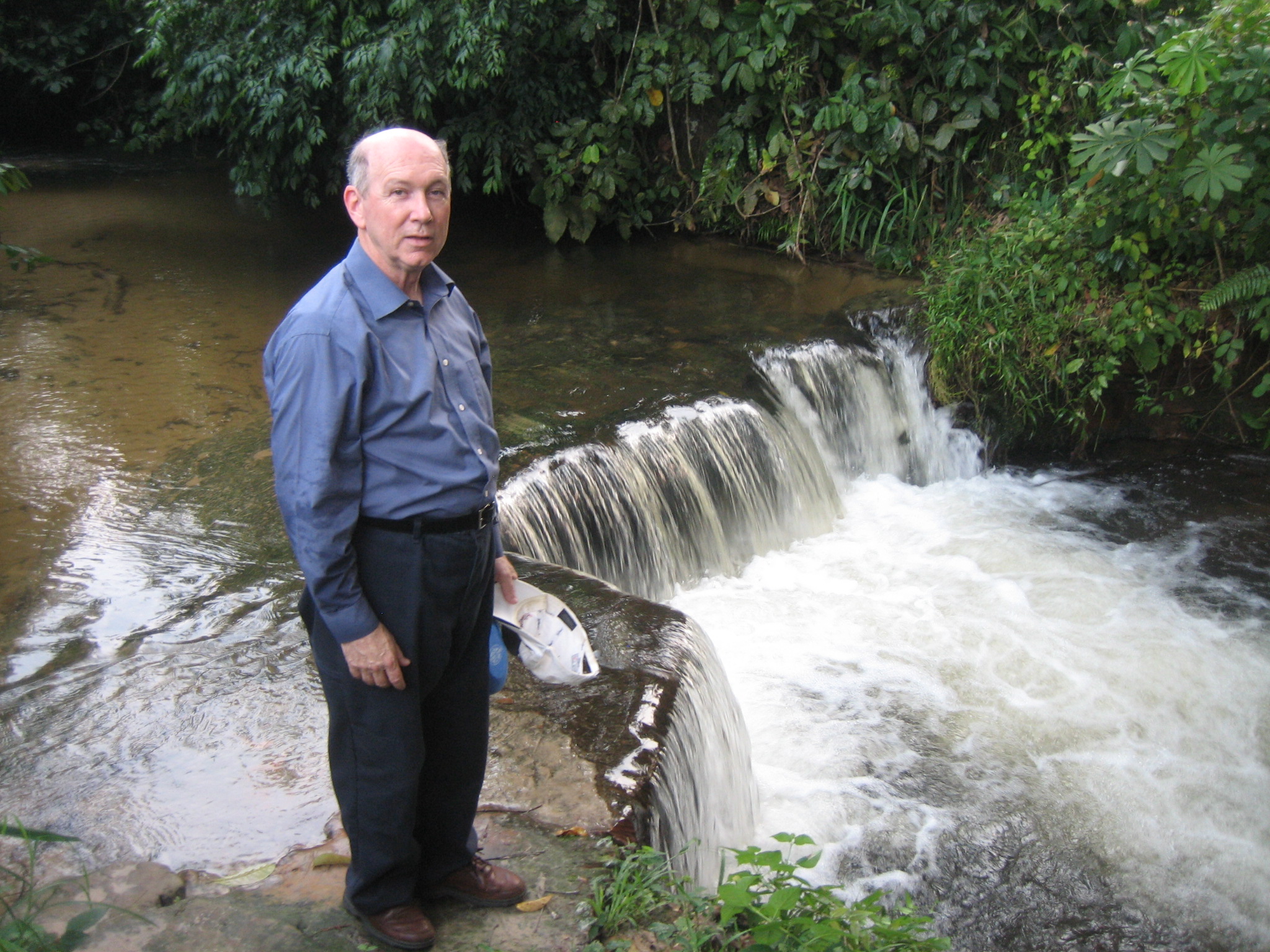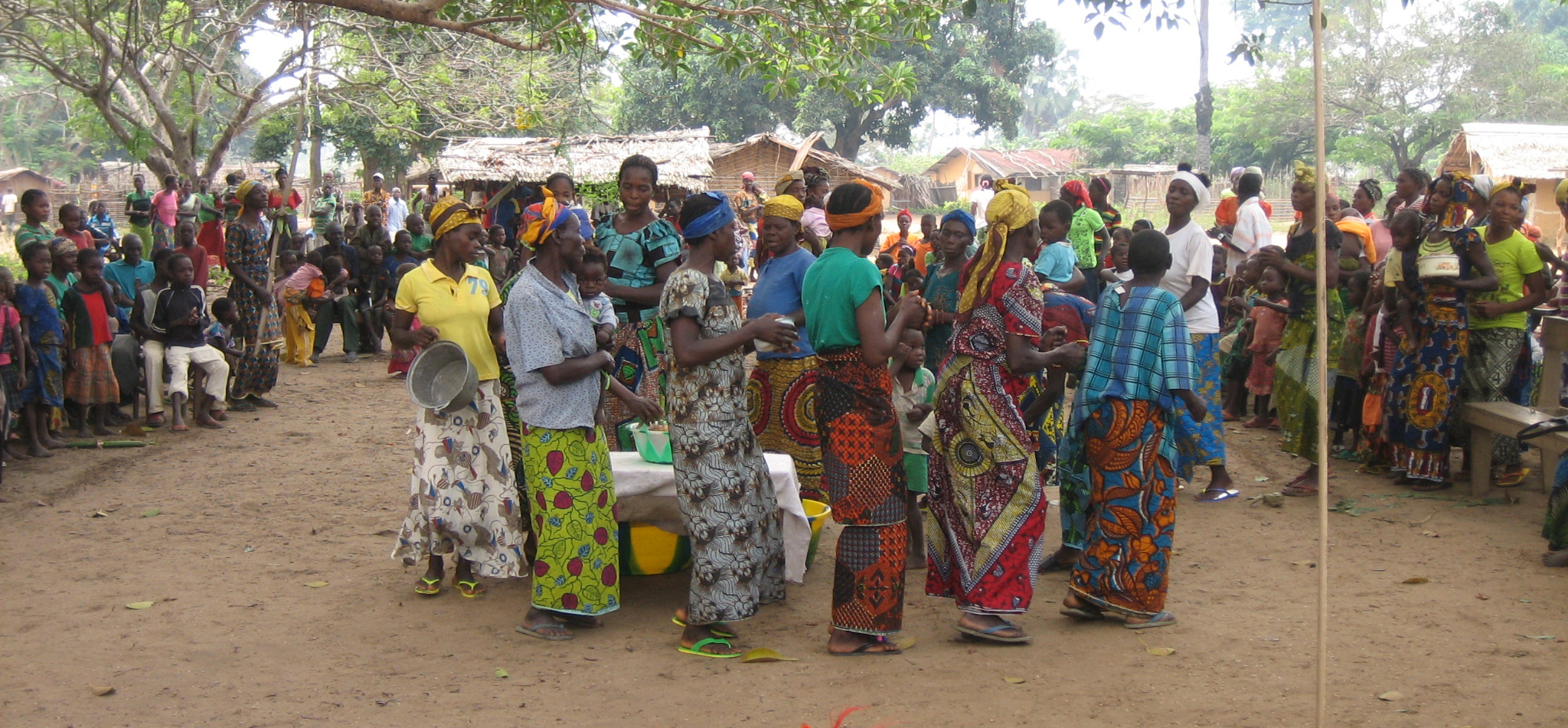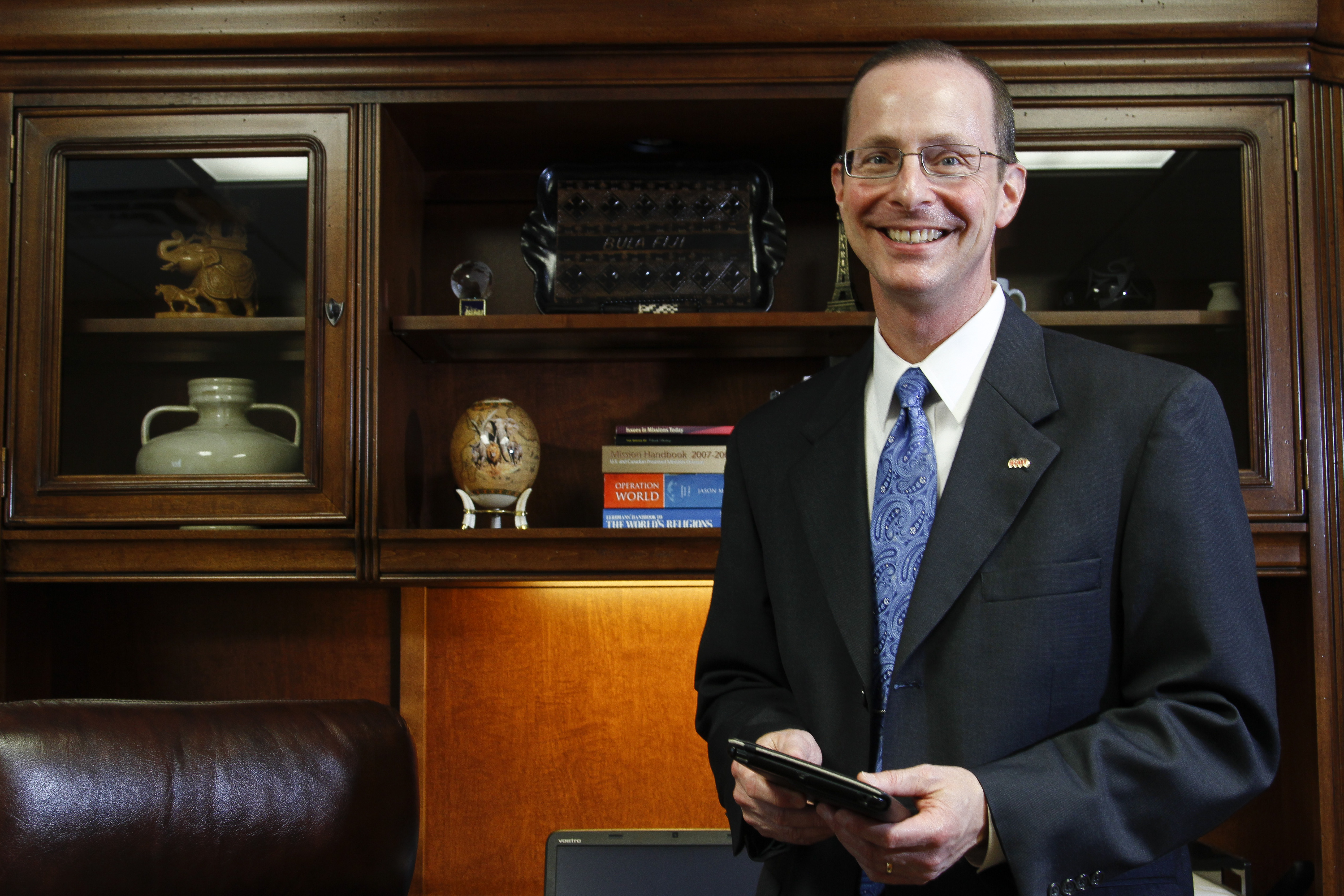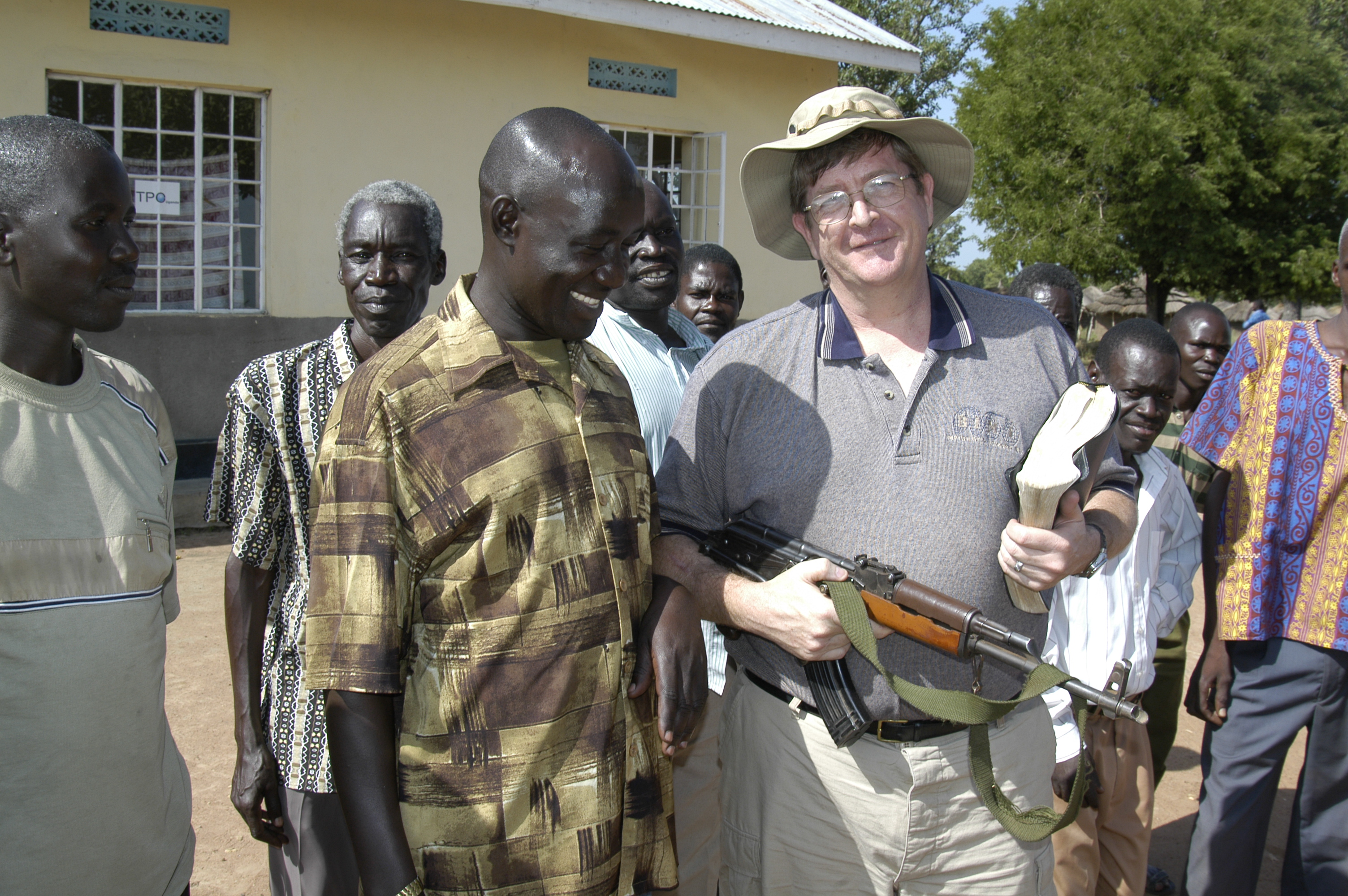 The extremist rebel group, the Lord's Resistance Army, was kidnapping and killing civilians and assassinating Ugandan political leaders in 2005 when Don Arnold, BIMI's audiovisual director, was there. The man in the gold-and-copper-patterned shirt is a Ugandan district leader, akin to a U.S. congressman. His bodyguards let Arnold hold one of their guns.
The extremist rebel group, the Lord's Resistance Army, was kidnapping and killing civilians and assassinating Ugandan political leaders in 2005 when Don Arnold, BIMI's audiovisual director, was there. The man in the gold-and-copper-patterned shirt is a Ugandan district leader, akin to a U.S. congressman. His bodyguards let Arnold hold one of their guns.10 most-dangerous countries for missionaries1. North Korea2. Somalia3. Syria4. Iraq5. Afghanistan6. Saudi Arabia7. Maldives8. Pakistan9. Iran10. YemenSource: Open Doors USA
Missionary MacGyverBIMI audiovisual director Don Arnold loves being called "the MacGyver of missionaries" as he travels the world, documenting mission work.His most recent making-something-from-nothing miracle occurred after a typhoon devastated the Philippines in 2013. He found himself lost on an island with no cellphone signal. So he climbed a telephone pole and, working with only bits of metal and cord, he patched into the phone line."I had no idea if it would work at the time," he says with a grin.Being handy in a crises is invaluable for Arnold since his missionary assignments can put him in explosive situations that require quick thinking.In 2003, he was in the Ivory Coast just as a fragile ceasefire in the country's civil war ended. Crowds armed with iron bars, clubs and machetes were killing foreigners and civilians. France, Spain and the United Nations commandeered commercial airliners to evacuate foreigners; military pilots flew the passenger jets.The night he was waiting for evacuation inside the airport in the capital city of Yamoussoukro, Arnold noticed a passenger plane's terrifying and bizarre takeoff."There were no airport lights outside, but the pilot turned off the cabin and cockpit lights on an Air France jet, then hit the runway in complete darkness, full throttle, snapped the plane up, then made it sharply bank and turn," Arnold says. "No one sshould do that to a passenger plane, but military pilots do it out of desperation when there's a good chance anti-aircraft guns are targeting them. It's called 'assault mode.'"It sounds like the simulated battle test from in "Star Trek: The Wrath of Khan" in which cadets had to figure out how to rescue civilians from peril under no-win circumstances."The Kobayashi Maru!" Arnold says, nodding happily in agreement.Like many tech wizards, he is a "Trek" fan who knows Capt. James Kirk conquered the test by rigging the game -- reprogrammig the computer simulation. Kirk maintained the Kobayashi Maru was a crucial test because the way one faces death is as important as how one lives life.Arnold says he saw a colleague in Zaire face his own version of Kobayashi Maru in the 1990s. He was traveling with BIMI missionaries and Zairen colleagues to a remote village when a gasket on their Jeep's engine blew. Arnold MacGyvered a patch with pieces of a laminated book cover, but the delay forced the group to travel at night."The road is awful, unmarked, no GPS, and we're headed through six-foot-tall sawgrass with no real landmarks to steer us to a village that isn't on maps," Arnold recalls. "The driver goes by instinct like, 'OK, I've driven this way about an hour now, I should make a left.'"Then, at the top of the hill, we see 200 armed bandits high on something, blocking the road."The bandit leader and mission translator argued for two hours, with the outlaw screaming that he was going to take the women as hostages as well as steal the Jeep. Arnold discreetly slipped enough water and food into his knapsack for three days. If gunfire broke out, he planned to run into the jungle to hide with his colleagues.But as the argument continued, a Zairen pastor held a Bible above his head and began telling the story of Daniel's miraculous night in the lions' den. Then he began singing "Amazing Grace." The bandits drifted away; the missionary group drove on to their village safely."In (Zaire), there's great respect for holy men, whether they're Muslim, village shamen or pastors," Arnold says. "They believe there's a higher power and holy ones communicate with it."The outlaws were pragmatic; no battered vehicle was worth antagonizing Daniel's mysterious God.Witnessing genocideRobert Parham knew he was going to ace the third-grade spelling bee. The son of missionaries, he was living an idyllic childhood in Jos, a city in northern Nigeria. He loved his school and, the day of the bee, had already memorized every word in his vocabulary book."Suddenly, a man burst into class; he was soaked in sweat and he was terrified," remembers Parham, now executive director of Nashville's Baptist Center for Ethics. "Everyone in class knew this man was running for his life."The man was Igbo, a minority ethnicity, mostly Christian and mostly living in southeast Nigeria. It was the man's horrific luck to live in Jos just as a genocide against Igbos was beginning.In the classroom, he begged the teacher to hide him from a Muslim mob. The frightened teacher led him to the principal, and the man hid on campus. But the next morning, a mob dragged the man from his hiding place to a grassy spot between the school dorms and playing fields and beat him to death.In 1967, the southeastern portion of Nigeria seceded to create the nation of Biafra in a desperate attempt to avoid anti-Igbo violence. In retaliation, Nigeria barricaded Biafra's food supplies and soon the international media was reporting that thousands of Biafrans were starving.U.S. Secretary of State Dean Rusk declared that the U.S. could do nothing to quell the violence in Nigeria because, though it had gained independence from Britain in 1960, it was still part of the "British sphere of influence."Parham's father, Bob, a highly respected missionary in Jos, could not prevent street mobs from dragging Igbos from their homes and killing them. But he could hide, feed and shelter Igbos and get many of the wounded onto small cargo planes, regularly loading severely injured Igbos into the family station wagon and driving to the airport, dodging homicidal crowds along the way. As each overloaded plane took off, Bob prayed with airport workers that the plane would clear the trees at the end of the runway.One day, he found the little boy who sold him a daily newspaper curled up in a doorway; a crowd had beaten him to death. Parham remembers his dad being heartbroken over lives he couldn't save."The embassies were no help at all ... the U.S. embassy just wished the missionaries would leave," Parham says.Catholic and Protestant missionaries united to arrange for airlifts of food and water to Biafra. Doctors Without Borders and other aid groups formed in reaction to the U.S. and Great Britain's unwillingness to help. In 1970, Biafra collapsed and was reabsorbed into Nigeria."One of the biggest changes in how missionaries view the world is that they no longer believe American interests overseas are always consistent with their faith," Parham says.Between two dictatorsWilliam Ackerle was a boy when he flew with his missionary parents to Bolivia in 1935. A rickety German junker carried the family between the 12,000-foot peaks of the Andes."The cabin wasn't pressurized well, so my pet cat threw up," Ackerle recalls. "Each passenger got chewing gum and cotton balls we could use in case our ears were bleeding."Ackerle learned fluent Spanish and, as an adult in the late 1950s, became a BIMI missionary to Cuba, then ruled by dictator Fulgencio Batista. Ackerle graduated from famously conservative Bob Jones University, but he seems judicious and temperate toward the communist dictator who would overthrow Batista -- Fidel Castro."I can remember how cruel Batista was to his people, including my congregation, which is why they put so much hope in Castro," Ackerle says, anger steeling his voice as he recounts the tragedies his congregants confided to him."Batista's men pulled one man out of his home, tied each of his feet to two separate Jeeps and ripped him apart. They locked another innocent man in a stall with a wild horse, who stomped the man to death."After Castro's 1959 coup, Ackerle continued teaching classes and supervised a church in his coastal Cuban town, located an hour outside Havana. He stayed until suspicion toward Americans triggered by the U.S. embargo and the failed Bay of Pigs invasion in 1961 "reduced my influence to nil."He is now retired but continues to translate news and Bible lessons into Spanish for a South American broadcast mission. And he still remembers Cuba with love.Spooks and spiesJ.B. Godfrey, executive director of Baptist International Missions Inc., says BIMI missionaries have never been debriefed by the U.S. Departments of State and Homeland Security. Yet when serving overseas, missionaries, including him, are routinely asked by locals if they are Central Intelligence Agency spies.The suspicions seem to arise from the fact that the CIA once used missionary work as a cover for unauthorized operations, a revelation that came to light in 1975 before the Church Committee, a Senate investigation chaired by Sens. Frank Church, D-Idaho, and John Tower, R-Texas. The news angered churches, including the Southern Baptist Convention, who complained that the CIA was risking missionary lives and alienating the people they wanted to help.Southern Adventist University professor Kris Erskine has been researching American missionaries in China during the 1930s and 1940s, people who routinely shared information with the CIA forerunner, the OSS, and the U.S. Foreign Service."The Church Committee found 21 instances of CIA working with missionaries or mission organizations in the '50s and '60s," Erskine says. "Based on my own research from the '40s, I located probably at least that number of missionaries who worked with CIA. And that is only in China."Missionaries were far better educated than most Americans in those decades, he explains, and, along with diplomats, they were among the few Westerners in China."Once the Nazis were defeated, fear of Russian and Chinese communists taking over the world seemed urgent, so sharing observations and intel seemed like common sense," he adds.Attitudes changed in the 1960s as various scandals rocked the CIA and missionaries wanted no part of its plots. The Cold War ended with China and Russia as our problematic allies. Erskine believes most missionaries "no longer automatically equate communism and Marxism with a threat to Christianity."
Thanks to the keen acoustics of the mountains around the tiny village of Tshene, you can hear death coming.
In the Congo, soldiers and rebels are noisy as they march, giving villagers just enough time to hide in the nearby jungle.
J.B. Godfrey arrived with his wife and children in Zaire (now Democratic Republic of the Congo) to reopen Tshene's abandoned mission school, clinic and church in 1991. As missionaries for the Harrison-based Baptist International Missions Inc., the family lived in a mud home with a dirt floor and no electricity or running water. They bathed in a beautiful waterfall a few minutes walk from Tshene. Villagers walked miles in harsh tropical heat to bring the Godfreys gifts of a single juicy cantaloupe or coconuts.
One day, during a church picnic, a colleague was playing in the nearby river when a hippo grabbed him by the waist and tried to bite him in half. He survived -- with indentations from hippo teeth permanently scarring his torso -- but had to wait in agony while an airlift was arranged by ham radio.
It was a scary reminder of how difficult evacuation would be if something far worse than hippos engulfed Tshene in Zaire's isolated west-central region. In 1993, the capital of Kinshasa erupted in riots. President Mobutu Sese Seko's corruption had rendered Zaire's currency worthless; shopkeepers and grocers refused to accept it as payment. Unpaid soldiers went on a rampage, looting homes and businesses. The French ambassador was murdered in a machine gun attack; foreigners fled to their embassies when the airport closed. Tshene is about 290 miles from Kinshasa, but angry soldiers will march that far to pillage the villages along the way.
BIMI found a pilot with a small prop plane to evacuate the Godfreys. Each family member could bring along only a small plastic bag of belongings, but the plane could not hold the entire family. Godfrey did not want to risk the pilot's life by forcing him to make two trips, so he said goodbye to his family then hid in the deep jungle with other villagers.
"When Americans are evacuated from a country, our missionaries should leave, too, but I just couldn't abandon my congregation," says Godfrey, now BIMI's executive director. "BIMI does not want martyrs. When an evacuation order is given, we expect our missionaries to comply. But sometimes you just have to trust a missionary's judgment. "
Godfrey was airlifted out a few weeks later when Kinshasa was calmer and Tshene seemed as safe as it's possible for a village to be in volatile Zaire. Even so, murderous ethnic violence was breaking out hundreds of miles to the north. The Godfreys returned to America.
Every American missionary stationed in dangerous place eventually confronts the decision: Do I stay or go? With missionaries now in more than 100 nations worldwide, the question repeatedly confronts BIMI officials. If a missionary stays in a country shredded by civil war, he or she might become a hostage, forcing U.S., United Nations or other troops to risk their lives to stage a rescue.
As an argument for staying, missionaries often cite Adventist aid worker Carl Wilkens, the only American to stay in Rwanda during the 1994 genocide. When Hutus murdered over half a million Tutsis, Wilkens protected Tutsi co-workers who sought refuge in his home.
Yet for missionaries, war isn't the only threat. Some countries are openly hostile to Christians or at least severely restrict missionary work. These so-called "closed" countries include North Korea, China and Iran, where missionaries are not allowed, and also Muslim countries like Saudi Arabia, Afghanistan and Syria, where they're simply not welcome.
Arrest, jail, even death face missionaries caught in these countries, so those who travel there must do so somewhat under cover, not calling themselves missionaries and finding creative ways to do their work under the radar. On its website, BIMI has a page about "nonresident" missionaries as "a way to penetrate closed or restricted countries with the Gospel" and lists alternate methods of spreading the Word, including as teachers and translators.
BIMI President David Snyder says that when Iran, North Korea and China declared missionary work illegal, BIMI stopped sending people or Bibles there. Some Christian groups will try to smuggle Bibles into such countries, "but we don't do that or condone it," he says.
Missionaries can also be threatened by disease outbreaks such as the current Ebola epidemic in Western Africa, where BIMI has missionaries stationed, although not in Liberia, ground zero for the outbreak, or Guinea, where six healthcare workers and two journalists were murdered by villagers who believed rumors that the group had come to infect them. But if a missionary is in a dangerous medical zone, BIMI doesn't automatically pull them out. It's the missionary's decision on whether to stay.
Always risky
Bob Klamser, a policeman-turned-missionary, is tough enough to disarm a drunken Peruvian Army general who was waving a gun in Klamser's face outside a restaurant. Klamser now heads Crisis Consulting International, which advised Chattanooga's First Presbyterian Church to cancel a mission trip this summer to Kenya because of terrorist threats against Westerners.
"The days of low hanging fruit -- quiet, risk-free countries -- for missions is gone," Klamser says. "Missionaries learn that most people, even in war zones, just want to work, love their family and friends and live life. If a mother tells a missionary she's worried about her son being recruited by a militia, that's a concern American mothers in cities might have about gangs. It's not a specific threat to America. Missionaries' conversations with congregants should have the same confidentiality as a mental health provider's."
Forging a friendship with someone whose skin color and centuries of culture are wildly different from one's own, then braving death together is an experience most Americans will never have. Interestingly, missionaries who have managed that feat frequently say they found that compassion and empathy often renders politics and nationality irrelevant.
Inner workings
Nestled inside Harrison Bay State Park at the end of Compassion Street, BIMI is a collection of pretty bungalows scattered across green hills. Retired missionaries live permanently in the houses, while BIMI headquarters perches above on a high bluff. Inside are offices and dozens of hotel rooms for missionaries who have returned to America for medical checkups and to see family before heading overseas again.
"This building was once a rehab center, which is why it has all the bedrooms," Godfrey explains. "It was abandoned and smelled like urine when we bought it on auction in 1994."
Among the support services BIMI offers its missionaries are health insurance, language training and doing the family's U.S. taxes for free. BIMI directors track the safety issues facing missionaries in their respective regions, keeping an eye out for signs of trouble.
Godfrey, Snyder, regional directors and its missionaries are not paid regular salaries; only secretaries and clerical staff have that. Missionaries and officers like Godfrey go on road trips nationwide to raise enough in donations from various churches to pay salaries that allow them to support their families and pay their bills.
Missionaries headed toward dangerous places take a safety course that covers how to behave when taken hostage and how to make evacuation arrangements. However, BIMI does not approve of "extreme Christianity," a movement that sends missionaries to active war zones, expecting God to protect them. Extreme Christians say God told them to take on the dangerous task. But Godfrey has a counterargument, also via God.
"We regard that behavior as tempting God, the way Satan tempted Christ in the wilderness," says Godfrey, who also served in Senegal.
In the Book of Matthew, Jesus is fasting in the desert when Satan suggests Christ prove his divinity to humans by jumping off Jerusalem's temple so angels can catch him. Jesus refuses, saying: "Thou shalt not tempt the Lord thy God." In Godfrey's view, extreme Christianity is akin to demanding that God protect those who take wild and showboating risks.
As part of its safety instructions, BIMI advises its missionaries to avoid political discussions. But that can be difficult. In Uganda, where BIMI has an orphanage, some conservative Christian leaders were accused of ratcheting up anti-gay violence while visiting government officials. Ugandan newspapers printed names and addresses of allegedly gay activists; some were later assaulted, others fired from their jobs.
"We stay clear of what those Christian groups are doing in Uganda," Snyder says. "If a Ugandan Christian asked what we thought of gays, we'd advise him to consult his Bible and remember to treat everyone with love."
Contact Lynda Edwards at ledwards@timesfreepress.com or 423-757-6391.
